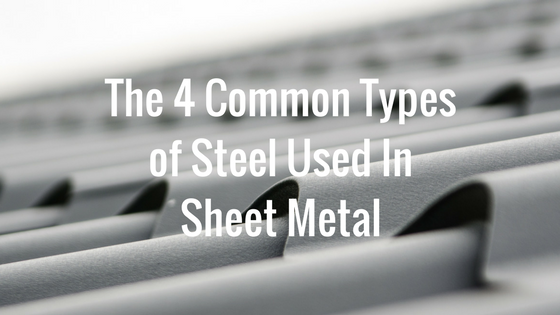Sheet metal fabrication is a cold-forming process that allows fabricators to produce thin metal sheets customized to a particular client’s business needs. This highly versatile process can produce different types of sheet metal from various metals, which the client will then use to manufacture components.
Steel and its different alloys are some of the most popular metals used in sheet metal fabrication. However, other metals like aluminum can also be used, producing desirable qualities in metal sheets suitable for various applications.

Below, we’ll go into further detail about the different types of metal sheets produced from these materials.
Alloy Steel
Alloy steel is one of the most popular materials used to produce metal sheets. It is made by alloying different elements, including manganese, chromium, and tungsten. Each component contributes to the metal’s overall properties, depending on how much of the material was used during production.
Alloy steel metal sheet types are famed for their strength and durability. They exhibit exceptional toughness when subjected to high loads and temperatures and resist wear and tear. Meanwhile, they also exhibit excellent corrosion resistance, machinability, and formability, allowing them to be a flexible material for metal sheet fabrication.
Carbon Steel
Carbon steel is a type of steel that is made by alloying iron with carbon to produce one of the sturdiest metal sheet types used in component manufacturing. There are three types of carbon steel: low-carbon steel, medium-carbon steel, and high-carbon steel.
Each type differs in carbon content, ranging from 0.05% to 1.5%. Increasing the amount of carbon will increase the steel’s hardness and strength. However, it can also increase its brittleness while also reducing its weldability.
Stainless Steel
Stainless steel is one of the most popular types of sheet metal used in metal fabrication processes. It is a type of steel alloyed with at least 10.5% chromium and less than 1.2% carbon by weight. It is a highly sought-after material in metal fabrication due to its excellent corrosion resistance, high tensile strength, superior fire and heat resistance, and machinability.
Stainless steel is ideal for applications requiring plenty of heat or moisture exposure. These can include manufacturing different products, such as kitchen sinks, boat parts, and various appliances.
Tool Steel
As the name indicates, tool steel is a type of metal used to produce tools such as cutters, reamers, punches, dies, blades, hammers, and components for machining metals, wood, and plastics. To achieve the necessary hardness for the production of these components, tool steel is typically melted in furnaces and processed further.
Tool steel contains 1% carbon and a mix of different alloying materials, which include tungsten, molybdenum, vanadium, and cobalt. These extra components enhance the steel’s mechanical characteristics, such as hardness, toughness, and wear resistance, making it the best choice for tooling applications.
Galvanized Steel
Metal fabricators choose galvanized steel as their material of choice because of the material’s strength, durability, and machining capabilities. Through galvanization, steel is given a protective coating of zinc, which improves the metal’s resistance to corrosion, ensuring the quality and longevity of manufactured steel products from this material.
Similar to stainless steel, galvanized steel is often used to manufacture products for applications that require frequent exposure to moisture. These include boat parts, irrigation systems, buckets, and greenhouse equipment.
Aluminum
Aluminum is one of the best types of sheet metal for applications that require a more lightweight material. It is famed for its excellent weight-to-strength ratio, ductility, and versatility, making it ideal for food and beverage packaging, automotive parts, cookware, construction materials, and appliances.
The Best Option
Sheet metal fabrication can deliver different levels of quality and offer desirable attributes that make them ideal for a wide range of applications. But while the quality of the end products will depend on the materials and manufacturing process, the dependability of your supplier makes all the difference.
Sheet metal fabrication can deliver different levels of quality and be based on the quality of the sheet metal being used. In addition, the experience of the personnel that produces it can help avoid mistakes that put deadlines in danger. Quick-Way Manufacturing offers state-of-the-art equipment and fast turnaround times, ensuring continuous access to the materials you need to maintain productivity and profitability. Contact Us today!

Comments are closed.